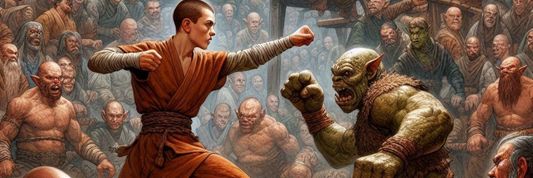Understanding D&D's Six Ability Scores: A Guide for New and Experienced Players
In Dungeons & Dragons (D&D), your character's abilities are defined by six core ability scores: Strength, Dexterity, Constitution, Intelligence, Wisdom, and Charisma. Each score represents a different aspect of your character's physical and mental capabilities. Understanding these scores and how they benefit different classes is crucial for creating a balanced and effective character. This guide will explain each ability score, how to calculate ability modifiers, and how these modifiers impact gameplay.
The Six Ability Scores
1. Strength (STR)
Strength measures your character's physical power and ability to exert force. It affects your character's ability to lift, carry, push, and pull objects. Strength is particularly important for melee combat and physical tasks.
- Key Classes: Barbarians, Fighters, Paladins
- Benefits:
- Increases melee attack rolls and damage.
- Improves ability checks for tasks like climbing, jumping, and swimming.
- Affects how much weight your character can carry.
2. Dexterity (DEX)
Dexterity represents your character's agility, reflexes, and balance. It influences your character's ability to move quickly and avoid danger. Dexterity is crucial for ranged combat and activities requiring finesse.
- Key Classes: Rogues, Rangers, Monks
- Benefits:
- Increases ranged attack rolls and damage.
- Improves Armor Class (AC), making your character harder to hit.
- Enhances skills like Stealth, Acrobatics, and Sleight of Hand.
- Affects initiative rolls, determining the order of actions in combat.
3. Constitution (CON)
Constitution measures your character's health, stamina, and vital force. It determines your character's ability to endure physical hardship and resist diseases and poisons.
- Key Classes: All classes benefit from a high Constitution.
- Benefits:
- Increases hit points (HP), making your character more resilient.
- Improves saving throws against effects that cause exhaustion, poisoning, and other physical ailments.
- Affects concentration checks for maintaining spells.
4. Intelligence (INT)
Intelligence reflects your character's mental acuity, analytical ability, and memory. It influences your character's ability to reason, solve problems, and recall information. Intelligence is vital for spellcasting for some classes.
- Key Classes: Wizards
- Benefits:
- Increases the effectiveness of Intelligence-based spells.
- Enhances skills like Arcana, History, Investigation, Nature, and Religion.
- Determines the number of languages your character can learn.
5. Wisdom (WIS)
Wisdom represents your character's perception, insight, and intuition. It affects your character's ability to understand the world and make sound judgments. Wisdom is crucial for survival and awareness.
- Key Classes: Clerics, Druids, Rangers
- Benefits:
- Increases the effectiveness of Wisdom-based spells.
- Enhances skills like Perception, Insight, Medicine, Survival, and Animal Handling.
- Improves saving throws against mind-altering effects.
6. Charisma (CHA)
Charisma measures your character's force of personality, persuasiveness, and ability to lead. It influences your character's ability to interact with others and inspire or intimidate them. Charisma is key for social interactions and spellcasting for some classes.
- Key Classes: Bards, Sorcerers, Warlocks
- Benefits:
- Increases the effectiveness of Charisma-based spells.
- Enhances skills like Deception, Intimidation, Performance, and Persuasion.
- Affects social interactions and leadership abilities.
Calculating Ability Modifiers
Each ability score has a corresponding ability modifier, which affects various aspects of gameplay. The ability modifier is calculated using the following formula:
Ability Modifier = (Ability Score-10)/2
Here’s a quick reference table for common ability scores and their modifiers:
|
Ability Score |
Ability Modifier |
|
1 |
-5 |
|
2-3 |
-4 |
|
4-5 |
-3 |
|
6-7 |
-2 |
|
8-9 |
-1 |
|
10-11 |
0 |
|
12-13 |
+1 |
|
14-15 |
+2 |
|
16-17 |
+3 |
|
18-19 |
+4 |
|
20-21 |
+5 |
Using Ability Modifiers in Gameplay
Ability modifiers are applied to various aspects of gameplay, including:
Attack Rolls
When you make an attack roll, you add the relevant ability modifier to your roll. For melee attacks, this is usually your Strength modifier. For ranged attacks, it's typically your Dexterity modifier.
Damage Rolls
When you hit with a weapon, you add the relevant ability modifier to your damage roll. This enhances your overall damage output, making high ability scores valuable in combat.
Saving Throws
Saving throws are checks to avoid or reduce the effects of harmful situations, such as spells or traps. Each class has proficiency in certain saving throws, which adds their proficiency bonus to the relevant ability modifier.
Skill Checks
Skill checks are used to determine the success of various actions, from climbing a wall to persuading an NPC. Each skill is associated with an ability score, and you add your ability modifier (and possibly your proficiency bonus) to your roll.
Spellcasting
For spellcasting classes, the ability modifier of your spellcasting ability (Intelligence, Wisdom, or Charisma) affects your spell save DC and spell attack bonus. A higher ability modifier makes your spells more effective and harder for enemies to resist.
Conclusion
Understanding the six ability scores and their modifiers is essential for creating a well-rounded and effective character in Dungeons & Dragons. Each score offers unique benefits that enhance different aspects of gameplay, from combat to social interactions. By grasping how these scores and modifiers work, you'll be better equipped to enjoy the rich and immersive world of D&D. So, roll those dice, embrace your character's strengths and weaknesses, and embark on your next great adventure!




